
A federal judge said the Department of Justice does not have to turn over additional evidence requested by former Trump National Security Advisor Michael Flynn’s legal team, dismissing a motion for federal prosecutors to be found in contempt, and setting a final date for Flynn’s sentencing hearing.
Flynn’s attorney Sidney Powell accused the government of intentionally withholding exculpatory evidence proving her client’s innocence, known as “Brady material” (named after the Supreme Court case Brady v. Maryland). Powell claimed the charges were entirely predicated on a government conspiracy aimed at intentionally destroying Flynn’s once sterling career. Powell previously made similar accusations.
In a scathing 92-page decision, Judge Emmet Sullivan of the U.S. District Court for the District of Columbia said Flynn and his legal team had no basis for such claims and were incorrect on several points of law critical to their argument. He even scolded Powell for plagiarizing portions of her filed legal brief, which some legal observers found to be judicial “grandstanding” on the part of Sullivan.
https://twitter.com/AndyGrewal/status/1206670990056599558
Concluding that Flynn “failed to establish a single Brady violation,” Sullivan reasoned that the Flynn legal team fundamentally misconstrued the law regarding Brady material in significant ways.
Sullivan rejected the assertion that Flynn was entitled to any incriminating evidence the government had against him prior to him being criminally charged.
“Mr. Flynn cites no controlling precedent holding that an uncharged individual is entitled to Brady evidence during an ongoing criminal investigation,” Sullivan wrote, because “Brady and its progeny does not require the disclosure of exculpatory or impeachment material to an uncharged individual during an ongoing criminal investigation.”
Sullivan also discarded the claim that Flynn was entitled to additional evidence to “evaluate the government’s allegations against him” and to determine how to proceed, reasoning that such a request doesn’t fall under Brady at all.
Sullivan also broke down the information sought by Flynn into categories: “information that does not exist,” “information that is not within the government’s possession,” and “information that Mr. Flynn concedes he is not entitled to.”
In response to claims that Flynn was intentionally deceived into pleading guilty to charges of lying to the FBI, Sullivan noted that Flynn does not dispute that he lied to the FBI, and further told the same lies to Vice President Mike Pence, and other White House officials.
“The sworn statements of Mr. Flynn and his former counsel belie his new claims of innocence and his new assertions that he was pressured into pleading guilty to making materially false statements to the FBI,” Sullivan wrote.
The Court also provided an entire section addressing the “ethical concerns” with Powell’s latest brief, saying that she “lifted verbatim portions from a source without attribution.” He provided an excerpt from the Court’s rules of conduct warning against “dishonesty, fraud, deceit, or misrepresentation.”
After several high-profile delays, Sullivan also scheduled Flynn’s sentencing hearing for Jan. 28.
You can read Sullivan’s full decision below.
Flynn Opinion 20191216 by Law&Crime on Scribd
[image via SAUL LOEB/AFP/Getty Images]